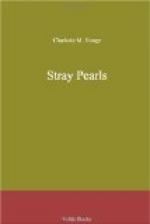I sat for a few minutes without opening it, and deemed it was my Book of Hours, for it was wrapped in a kerchief of my own; but when I unfolded that, behold I saw a small sandal-wood casket, and turning the key, I beheld these few words—’Praying my Lord Walwyn to permit restitution to be made.—M.van H.’ And beneath lay the pearls of Ribaumont.
‘No! no! no, I cannot!’ cried my brother, rising to lean from the window and beckon back the messenger; but I pulled him by the skirts, telling him it was too late, and whatever he might think fit to do, he must not wound the lady’s feelings by casting them back upon her in this sudden manner, almost as if he were flinging them at her head. He sat down again, but reiterated that he could not accept them.
I told him that her jewels were wholly her own, subject to no restrition, but this only made him ask me with some displeasure whether I had been privy to this matter; the which I could wholly deny, since not a word had passed between us, save on the schemes for sending aid to the distressed families.
‘I thought not,’ he returned; and then he began to show me, what needed little proof, how absolutely inexpedient it was for his honour or for hers, that he should accept anything from her, and how much more fitting it was that they should be absolutely out of reach of all intercourse with one another during her year of mourning, or until he could fitly address her.
‘No,’ he said; ’the pearls must remain hers unless she can come with them; or if not, as is most like, we shall be the last of the Ribaumonts—and she may do as she will with them.’
‘You have no doubts, Eustace?’ I cried. ’You care not for her wealth, and as to her face, a year will make it as fair and sweet as ever.’
‘As sweet in my eyes, assuredly!’ he said. But he went on to say that her very haste in this matter was a token that she meant to have no more to do with him, and that no one could wish her to give up her wealth and prosperity to accept a poor broken cavalier, health and wealth alike gone.
I would have argued cheeringly, but he made me understand that his own Dorset estates, which Harry Merrycourt had redeemed for him before, had been absolutely forfeited by his share in Montrose’s expedition. The Commonwealth had in a manner condoned what had been done in the service of King Charles, but it regarded as treason the espousing the cause of his son; and it was possible that the charge on the Wardour estates might be refused to Millicent should she unite herself with one who was esteemed a rebel.




